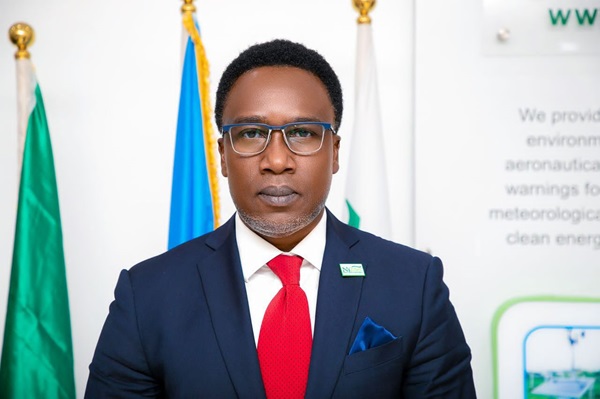
Industry stakeholders hailed the appointment of Prof. Charles Anosike as the director-general of the Nigerian Meteorological Agency (NiMet) as a significant milestone.
His appointment was seen as a perfect fit, given his deep-rooted experience. Before assuming the leadership role, he served as the director of the Directorate of Applied Meteorological Services (DAMS), a key division that drives much of NiMet’s core operations.
When asked about his legacy goals, Anosike emphasised his commitment to creating value at NiMet:
“I aim to ensure that NiMet becomes synonymous with value creation. This involves leveraging meteorological data to improve lives, enhance prediction accuracy, and ensure the effective dissemination of climate information. When people receive timely weather forecasts, comprehend them, and use them to make smarter decisions, we create a ripple effect of sustainable value. Moreover, staff welfare is crucial. I want NiMet personnel to reflect on my tenure as a time of vibrancy and growth.”
He further identified opportunities rather than challenges, stressing the need for private-sector collaboration:
“A low-hanging fruit is reaching out to the private sector to involve them in NiMet’s activities, allowing them to see the tangible benefits we offer.”
Over the past year, Anosike has made impressive strides in this direction.
In line with the performance bond signed by parastatal CEOs with the Minister of Aviation and Aerospace Development, Festus Keyamo SAN, Anosike and his team have worked tirelessly to implement the ministry’s five-point agenda.
Milestones Achieved in 2024
One major achievement was the successful metadata evaluation of weather observation stations across the country. This thorough exercise ensured that all stations were updated, strengthening NiMet’s operational capacity.
Anosike also facilitated a groundbreaking partnership with the Nigerian National Petroleum Corporation (NNPC), marking the first time NiMet secured NNPC’s support. This collaboration was announced during the unveiling of the 2024 NiMet Seasonal Climate Prediction (SCP). Furthermore, NiMet has attracted interest from international partners and local government agencies, including the Nigeria Governors’ Forum (NGF), leading to several service delivery agreements.
In December 2024, NiMet hosted the second roundtable meeting on an “Anticipatory Action Framework for Nigeria,” a collaborative effort with the United Nations Office for the Coordination of Humanitarian Affairs (UNOCHA). Convened by Vice President Kashim Shettima’s office, the meeting aimed to establish a unified approach to anticipatory action in Nigeria.
NiMet also forged an agreement with the Maritime Organisation of West and Central Africa (MOWCA) to promote maritime weather observation, early warnings and capacity-building initiatives focused on marine meteorology for MOWCA member states.
Human Capacity Development
One of the agency’s notable achievements under Anosike has been addressing staff concerns regarding training opportunities. Within the past year, NiMet prioritised human capacity development, ensuring that staff at all levels benefitted.
For instance, state meteorological managers participated in a week-long training, while directors and senior management staff attended a session on the balanced scorecard performance management system. Additionally, the National Meteorological Institute of Science and Technology (NMIST), a NiMet-owned institution, received recognition from the National Board for Technical Education (NBTE) as a mono-technic institution. The NMIST also secured approval to commence National Diploma programmes in Meteorology and Climate Change Sciences at its Lagos campus.
Improved Industrial Relations
Through Anosike’s people-centric leadership style, industrial harmony has been restored at NiMet. Unionised staff, previously dissatisfied over outstanding minimum wage arrears, now trust management’s commitment to resolving labour issues. A looming strike in May 2024 was averted through constructive engagement and the arrears, dating back to 2019, were paid.
Technological Innovations
NiMet has embraced innovation, with significant investments in hardware, software and meteorological equipment. The ICT unit restored the agency’s data center to near-optimal performance, integrated Climsoft (a climate management system) and launched a revamped, interactive website.
Additionally, NiMet unveiled a state-of-the-art digital weather studio equipped with advanced graphics and animation capabilities. Combined with newly introduced branded weather presenter jackets, the studio promises a world-class viewing experience.
Revitalised Flagship Events
The annual Seasonal Climate Prediction (SCP) event has been revitalised under Anosike’s leadership. With strengthened partnerships, NiMet is now better positioned to downscale the SCP to communities nationwide—a cause close to the DG’s heart.
Aviation Safety and Infrastructure
Aviation safety remains a top priority at NiMet. The quality management system unit has organised extensive training sessions to ensure that the agency meets international standards.
The data archive centre, crucial for preserving meteorological records, has been renovated and equipped under a data rescue project. Furthermore, the carpentry workshop at NiMet’s regional training centre in Lagos has been reactivated to produce furniture for the agency and external clients.
Future Focus
Looking ahead, Anosike outlined his vision for NiMet:
“We aim to enhance our monitoring infrastructure, improve information sharing and adopt cutting-edge technologies such as artificial intelligence for better weather modeling and early warnings. Additionally, we plan to strengthen public-private partnerships to sustain growth.”
Conclusion
As Anosike continues to steer NiMet towards greater heights, it is evident that his leadership has brought renewed energy and purpose to the agency. His achievements over the past year highlight his dedication to advancing NiMet’s mandate of delivering accurate weather and climate information for Nigeria’s socio-economic development and safety.
The management, staff and stakeholders must continue to support his efforts to ensure that NiMet remains a vital institution in Nigeria’s progress toward climate resilience and sustainable development.

